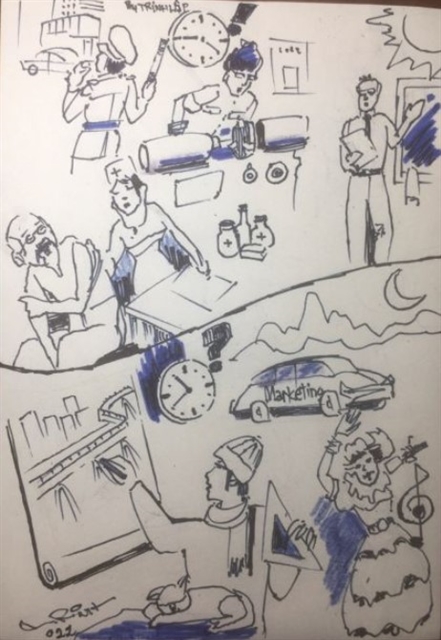 Talk Around Town
Talk Around Town

 |
| Illustration by Trịnh Lập |
By An Phương
HCM CITY – If nothing else, the COVID-19 pandemic has forced us to look practically at how technology is changing the world, especially our working hours.
I think this has and should prompt a rethink of the eight-hour workday concept that revolutionised work culture in the early 1900s when Henry Ford came up with it to attract workers used to doing 12 hours a day.
The idea emerged from the notion that in order to achieve a more balanced lifestyle, the 24-hour day should be divided into three equal parts: eight hours of work, eight hours of rest, and eight hours of recreation.
At Ford’s factories, workers would be offered an overtime salary when working beyond 40 hours per week. The result was an immediate and obvious rise in productivity.
However, I think it is time to remember that working conditions during the heydays of the Industrial Revolution were nothing like what we experience today.
I have two jobs now, one of the 9-5 affair and the other that offers a lot more flexibility. I used to believe eight hours a day at an office desk was designed to extract maximum productivity, but I am sceptical now.
The tech-savvy younger generation, in particular, might look askance at this long-standing work tradition.
Thanh Tâm, 28, who works for an advertising agency, thinks the 9-5 concept might have worked in the 1900s, but today it carries an outdated logic that needs to be reworked.
“I used to be a part-time saleswoman at a fashion outlet during my university days and worked eight hours per day, two days per week. Since I was busy with school projects, the eight-hour shift was perfect for me to recharge my energy. I did not give so much thought to it as I was happy with the payment. However, everything changed when I officially entered the professional job market,” she told me.
“The advertising world taught me to be flexible with working hours. It might sound unprofessional, unhealthy and unbalanced but I do exchange work with colleagues in the middle of the night, especially when an important campaign is coming up,” Tâm said, adding that there are times when she would do absolutely nothing during weekdays.
But my computer engineer friend, Anh Tú, 26, believes that the emphasis on work-life balance contained in the concept of an eight-hour workday is still relevant.
I find that I agree with both friends. I have experienced both types of jobs and noted that the nine-to-five schedule gives me more control of my life. I can take the initiative to schedule a dinner or movie date after work or decide to cook at home and enjoy the night with my family, which I could rarely do with jobs that did not have a specific daily schedule.
For me, it would be a challenging task to find the discipline needed to manage my day effectively if and when the eight-hour mode is done away with.
It requires experience to be flexible and productive at the same time, I feel.
That said, I personally prefer the flexibility because it allows me to extract maximum productivity at a time when I am focused, motivated and energetic, ensuring that my lethargic times do not hurt me or my work.
"I will continue to choose flexible working hours even if I quit my current job because I have learnt to find joy in my ‘chaotic’ life. Productivity means so much more if I am able to pursue what I really love,” Tâm said, adding that she plans to learn new soft skills that can ensure a stable income, something she can do only if she has flexible working hours.
Where creativity is involved, Tâm and I are on the same page.
Flexible working conditions are more likely to bring inspiration and creative ideas, translating into quality content for clients.
Tú said he would never have believed that working from home would work out, especially when he was a computer engineer with regular face-to-face interactions with his clients.
“The pandemic introduced new working conditions for reasons related to health and safety and I had no choice but to learn to optimize my working habits. I started looking into products that can better support my clients in the comfort of their own homes.
“Despite initial struggles, this has unveiled a plethora of hidden benefits related to the flexible working culture, including a noticeable increase in productivity, creativity and overall physical and mental health of an employee,” Tú said, adding that it has become much harder to ignore the positive impact of this new way of life.
"Well, it really depends on the industry," said my friend Anh Khang, a 31-year-old bank clerk.
“The eight-hour work day has been and will forever be valid for bank workers, especially those with front-desk positions, who cannot work with timings at odds with most clients.”
Khang felt that it would take many years to witness a major change in the current working culture. For instance, he noted, most public sectors would surely be very slow to adapt to a shift towards more flexible working conditions.
I think he could be wrong. More companies have started or will start experimenting and taking steps to figure out what type of workday works best for their industry.
In fact, this has become clear in the aftermath of the COVID-19 pandemic. The proven viability of remote work could well mark the beginning of the end of the good old 40-hour work week.
My friends and I agree on one thing, though. Whatever happens and however it happens, things will work out. - VNS




